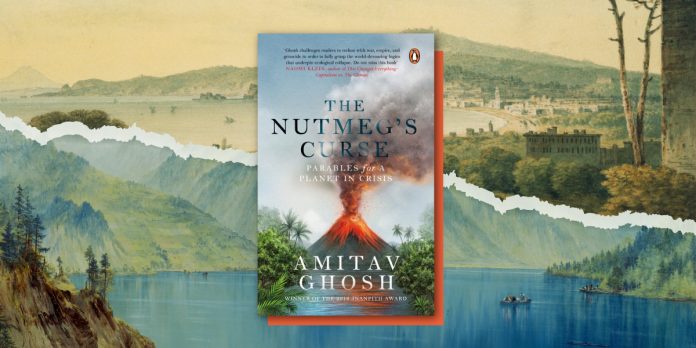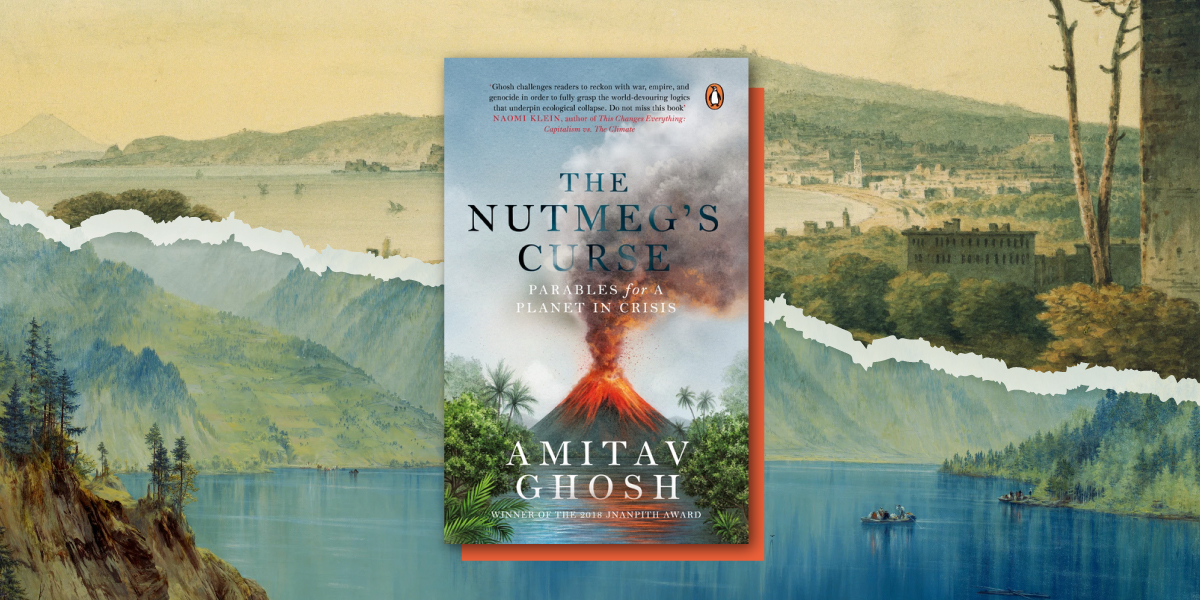The Nutmeg’s Curse: Parables for a Planet in Crisis
by Amitav Ghosh
Publisher: Penguin (2021)
Amitav Ghosh’s ‘The Nutmeg’s Curse’, was quite a refreshing breather from the course of graphs and figures, usually taken when discussing climate change. The book provides an urgently required outlook of the importance of the intangible indigenous traditional wisdom, which has escaped the grasp of rational and scientific perception of nature.
The book starts off by analysing the way colonisation, with the psychological underpinnings of perceiving nature as an ‘inert resource’, merely to be utilised. This view extended to the land – converting vast tracts of virgin biodiverse rich forests to productive plantations and also humans – where the coloured population were considered ‘brutes’ so as to not even acknowledge them as human, but as a resource to tame and put to use. Everything available was leveraged with the sole motto to amass profits. The validation of the religion that the ‘savage’ shall be civilised or cut off from the face of earth also justified the ‘civilised’ nations to wreck genocides over the primitive groups living in close tandem with nature, which unfortunately still continues unabated . The political decisions in many countries like India and Brazil are still prioritising the interests of billionaire industrialists over the rights of the native populace over their sacred forests. The author emphasises on the idea that violence has always been a vehicle through which the civilisation maintained itself. Trade and war, since imperial times always went hand in glove.
The discourse made me relate to a lot of pop-fiction examples like that of Avatar, Meluha, etc. where the masculine urge of the civilised, being unable to comprehend the Prakriti – nature, are hell bent on suppressing and dictating femininity to their whims and fancy. But nature too has its way to retort back, as is evident in the escalated climate related disasters in recent times. The rational or the scientific outlook of evaluating forests on variables of tree cover and density have failed to perceive the vitality of forest as a living entity, having a spirit of its own, imbibed among its inhabitants. The church through demonising what it was unable to comprehend labelled the Shamans who could converse with the land and forests, as evil and were executed through witch hunting. The later generations carefully groomed in modern ways were carefully herded away from relating to their cultural roots resulting in loss of immense rich and diverse oral wisdom.
Amitav emphasises that nature is much more than a complex assortment of life forms. We need to step away from the standpoint where humans occupy the superiority of life forms. He also calls attention to the way academia through its papers, numbers and stats talk too abstractly and obscure the role of big players from the spotlight. Media, which is increasingly being owned by the big corporations is leading to a malleable public opinion on most concerning things. He highlights how the repercussions of climate change do not shield the rich because of their high GDP’s as the world has witnessed during the COVID crisis. The distress migrations induced by climate catastrophes and are unequally. impacting those who barely have any substantial carbon footprint. The way forward appears to understand the continuing ripples of colonial mindset towards systems which are life enabling and make a voluntary effort to break away from it by relooking at larger market systems and lifestyles. It needs to be acknowledged that the capitalistic systems are a careful curation of aspiration and the earth, with its finite resources cannot possibly cater to the rising energy intensive lifestyles aping the west.
“To bring him out of savagery into citizenship, we must make the aboriginal touched by the divine angel of discontent.”






RELATED ARTICLESMORE FROM AUTHOR
Kashmir: A Valley That Goes Beyond Personal Anger
Of Oppressor’s Body & Mind
Last Among Equals: Power, Caste & Politics in Bihar’s Villages